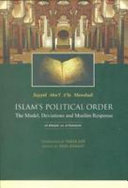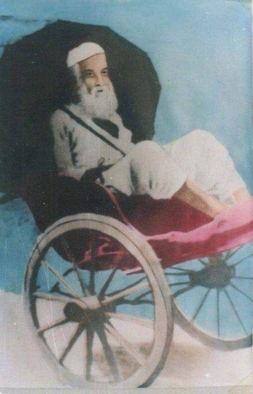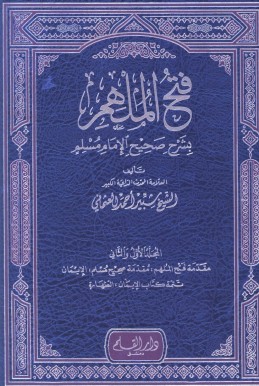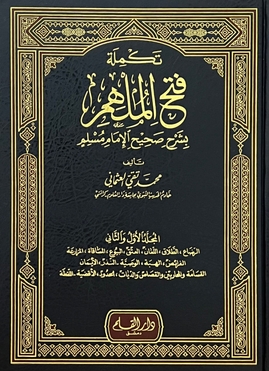
Muhammad Taqi Usmani SI, OI, is a Pakistani jurist and a leading scholar in the fields of Qur'an, Hadith, Islamic law, Islamic economics, and comparative religion. He was a member of the Council of Islamic Ideology from 1977 to 1981, a judge of the Federal Shariat Court from 1981 to 1982, and a judge in the Shariat Appellate Bench of the Supreme Court of Pakistan from 1982 to 2002. In 2020, he was selected as the most influential Muslim personality in the world. He has been conferred the title of Shaykh al-Islām for his knowledge in Islamic studies. He is considered a leading intellectual of the contemporary Deobandi movement, and his opinions and fatwas are widely accepted by Deobandi scholars and institutions worldwide, including the Darul Uloom Deoband in India. Since 2021, he has been serving as the Chairman of Wifaq ul Madaris Al-Arabia. His father, Shafi Usmani, was the Grand Mufti of Darul Uloom Deoband and migrated to Pakistan with his family after the partition of India in 1948.
Muhammad Rafi Usmani was a Pakistani Muslim scholar, jurist and author who served as the President of Darul Uloom Karachi. He was an alumnus of Darul Uloom Deoband, University of the Punjab and the Darul Uloom Karachi. He authored books including Ahkām-e-Zakāt, Al-Tālīqāt al-nāfi'ah alā fath al-mulhim, Islām mai aurat ki hukmrāni and Nawādir al-Fiqh. He was a syndicate member of the University of Karachi, vice-president and a member of the executive council of Wifaq-ul-Madaris. His brother Muhammad Taqi Usmani is also a senior scholar.

Mufti Mehmood was a Pakistani politician and Islamic scholar who was one of the founding members of the Jamiat Ulema-e-Islam (JUI).

Khilafat o Mulukiyat is a book written by Abul Ala Maududi in October 1966 as a refutation of the book, The Caliphate of Mu'awiyah and Yazid by Pakistani scholar Mahmood Ahmad Abbasi.
Following is a list of English translations of the Quran. The first translations were created in the 17th and 19th centuries by non-Muslims, but the majority of existing translations have been produced in the 20th and 21st centuries.
Manazir Ahsan Gilani was an Indian Sunni Islamic scholar and former Dean of the Faculty of Theology at Osmania University. Some of his notable works include Tadwin-e-Hadith, Muqaddama Tadwin-e-Fiqh, Sawanih-e-Abu Dharr Ghifari, and Sawanih-e-Qasmi. Muhammad Hamidullah, a historian and hadith researcher, was among his students.
Rūh al-Ma'ānī fī Tafsīri-l-Qur'āni-l-'Aẓīm wa Sab'u-l-Mathānī is a 30-volume tafsir of the Qur'an, authored by the 19th-century Iraqi Islamic scholar Mahmud al-Alusi.
Ma'ariful Qur'an is an eight-volume tafsir (exegesis) of the Quran written by Islamic scholar Mufti Muhammad Shafi (1897–1976). Originally written in Urdu, it is the most prominent work of its author.
Saeed Ahmad Akbarabadi was an Indian Islamic scholar and an Urdu-language author who co-founded the Nadwatul Musannifeen. He served as the dean of the Faculty of Theology in Aligarh Muslim University.
Aziz-ul-Rahman Usmani was an Indian Sunni Muslim scholar who served as first Grand Mufti of Darul Uloom Deoband. He is best known for his Fatawa Darul Uloom Deoband. His brother was Shabbir Ahmad Usmani.
Kafīlur Rahmān Nishāt Usmānī was an Indian Muslim scholar, jurist, and a poet who served as a Mufti of Darul Uloom Deoband. He was the grandson of Azizur Rahman Usmani. He was an alumnus of Darul Uloom Deoband and the Aligarh Muslim University. He translated Fatawa 'Alamgiri into the Urdu language and issued more than fifty thousand religious edicts.

Tauzeeh Al-Qur'an Asan Tarjuma Quran is a three-volume tafsir (exegesis) of the Quran written by Pakistani Islamic scholar Mufti Taqi Usmani. The book was originally written in Urdu and has been translated into at least two languages, Bengali and Hindi.

Hakeem Muhammad Akhtar was a Pakistani Sunni Muslim scholar, poet, philanthropist and a Sufi mentor. He established the Jamiah Ashraful Madāris in Karachi. He was an alumnus of the State Unani Medical College Allahabad and the Madrasa Bait-ul-Uloom, Sarai Mir. He was an authorized disciple of Abrarul Haq Haqqi. His works include Ma'ārif-e-Masnawi and Faizān-e-Muḥabbat.

Mahmood Ashraf Usmani was a Pakistani Islamic scholar, jurist and an author and headed the Dar-ul-Ifta at Darul Uloom Karachi. He was an alumnus of Jamia Ashrafia and the Islamic University of Madinah. He reportedly issued over a hundred thousand religious edicts and authored about three dozen books on hadith, mysticism, jurisprudence and tafsir.

An Introduction to Islamic Finance is a book written by Pakistani scholar Taqi Usmani on Islamic banking and finance. The book remains one of the gateway publications on Islamic finance. Most of the focus of the book is on banking rather than fund management. The author urges Islamic banks to develop their own culture, as ultimately it is the value system that matters. The book displays Usmani's pragmatism, and the clarity of the solutions offered which he believes to be Sharia compliant.

Islam and Modernism is a book originally written in Urdu by Pakistani scholar Taqi Usmani on Islam and modernity. The original title is "Islam aur Jiddat Pasandi". Two years later it was translated into English with the title Islam and Modernism. It was first published in 1990. In this book the author discusses many western issues that have been brainwashing Muslims for a long time. He is not against progress per se, but believes that common Western practices have nothing to do with material and industrial progress. It gives a logical idea of Islamic law and also describes how people have tried to change it to suit themselves in the past and also in the present. The book challenged the modern mindset with logical arguments. It gives a meaning to modernism and discusses how Islam encourages modernism. In this book, the author has also presented that, in the name of progress and modernity, the terrible fitnah of anti-Islamic beliefs and destruction of character that is engulfing the world, is actually stupidity and backwardness. It has discussed modernity, science, industrial revolution, Jihad etc. with Islam. The author has done considerable research to compile situations from the past to make his argument comprehensive. The book is foreworded by the author himself.

This bibliography of Ashraf Ali Thanwi is a selected list of generally available scholarly resources related to Ashraf Ali Thanwi, a leading Islamic scholar, philosopher, writer, preacher, reformer, the author of about one thousands books. He didn't write an autobiography during his lifetime. However, Aziz al-Hasan Ghouri, an authorized disciple of Thanwi, compiled a book from 1935 to 1943, into four volumes entitled Ashraf al-Sawaneh, which is the first and most important book and prime source on the biography of Thanwi. Another Maqalat Hakeemul Ummat was compiled in 34 volumes under the supervision of Taqi Usmani, collected from about 350 publications of Thanwi. This list will include his biographies, theses written on him and articles published about him in various journals, newspapers, encyclopedias, seminars, websites etc. in APA style.

The Noble Quran: Meaning With Explanatory Notes (2007) is a two-volume translation of the Quran, authored by Pakistani Islamic scholar Taqi Usmani. Usmani served as judge of the Sharia Appellate Bench of the Supreme Court of Pakistan. In addition to the original Arabic text, the translation includes brief English explanatory notes. It is the first English translation of the Quran authored by a traditionalist Deobandi scholar.

Fath al-Mulhim bi-Sharh Sahih al-Imam Muslim is a three-volume Arabic commentary on Sahih Muslim, written by Shabbir Ahmad Usmani before 1916. Usmani commenced the writing of the book in 1914 due to the absence of commentaries on Sahih Muslim, unlike Sahih al-Bukhari, which had commentaries according to the Hanafi school. He dedicated himself to bridging this gap and continued his work until his demise. He was only able to complete three volumes of the book before his passing. The first and second volumes were published in 1933 and 1935 respectively, while the third volume was published in 1939. Taqi Usmani later took up the task of completing the remaining portions of the book in 1976, ultimately finishing it in 1994 in six volumes known as Takmilah Fath al-Mulhim bi-Sharh Sahih al-Imam Muslim.

Takmilah Fath al-Mulhim bi-Sharh Sahih al-Imam Muslim is a six-volume Arabic commentary on Sahih Muslim, authored by Taqi Usmani. It serves as a supplement to Fath al-Mulhim bi-Sharh Sahih al-Imam Muslim, a work initially written by Shabbir Ahmad Usmani, who completed three volumes before his demise. Taqi Usmani commenced writing this scholarly work in 1976, inspired by his father, Shafi Usmani, to carry on and complete the unfinished endeavor. After an 18-year journey, he finalized the book in 1994, earning widespread recognition for its quality. The commentary covers essential topics, including fiqh, justice, politics, economics, social policy, morality, virtues, and other aspects of Islamic teachings. Taqi Usmani's work is particularly known for its analysis, incorporation of diverse languages, inclusion of biographies, fiqh methodologies, and relevant fiqh rulings, making it a reference for both students and scholars alike.












